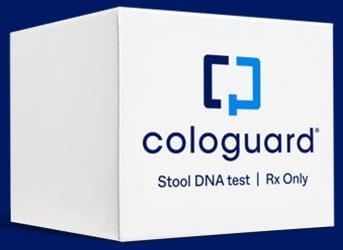COLOGUARD ADHERENCE
Observed adherence nearly doubles with the Cologuard® test1,2
Adherence
Over 1.5 million of ~2.1 million patients were adherent to the Cologuard test in a retrospective cohort study1
Adherence
~900 of 2400 patients were adherent to screening colonoscopy according to a separate clinical study2
Average-risk patients preferred the Cologuard test over colonoscopy in a discrete choice experiment study. 3*
All panelists are paid speakers, presenting on behalf of Exact Sciences. Views, opinions, and information provided during this presentation are based on the speakers’ own clinical practice and experience and are not clinical, diagnostic, or treatment advice for any particular event. Exact Sciences does not recommend or endorse any particular course of treatment or medical choice.

Better outcomes with the Cologuard test
View the impact of a positive Cologuard result on follow-up colonoscopy adherence and quality.
After a positive Cologuard result, 79% of patients adhered to a follow-up colonoscopy.5‡
Cologuard adherence is supported by its patient navigation program6
Outreach through the patient navigation program resulted in an increase in adherence vs Cologuard patients who did not receive outreach.6§

Belinda Khou has been compensated for sharing their expertise and for acting as a consultant for Exact Sciences.
- Individuals at average risk for CRC aged 45 to 75 (n=1249) preferred mt-sDNA (38.3%) over colonoscopy (32.5%; P<0.001).3
- Based on National Health Interview Survey data on CRC screening rates in 85,571 adults 50-75 years from 2005-2021. Starting in 2018, the survey began including mt-sDNA testing as a screening option. From then until the end of the study period, mt-sDNA testing had the largest increase in utilization and contributed the most to overall screening rates.4
- Continuous enrollment was required for ≥1 years after a positive stool-based test until the end of disenrollment, 3 months after a claim indicating high-risk criteria, or end of the study period.5
- Based on internal data from February 11, 2022, to September 5, 2022, that compared eligible patients who received outreach from the patient navigation program with a small control sample that did not in order to evaluate program effectiveness.6
CRC=colorectal cancer; mt-sDNA=multitarget stool DNA.
